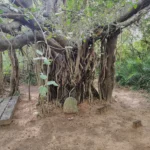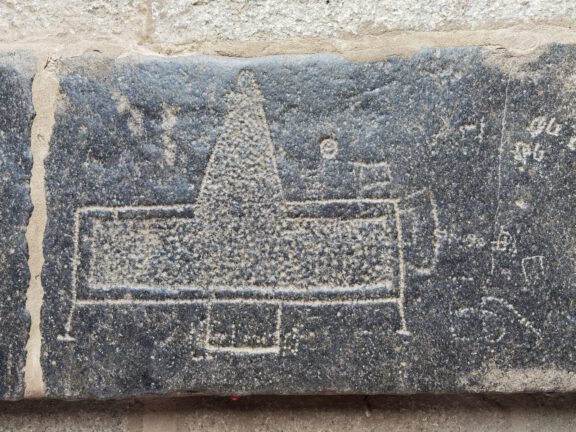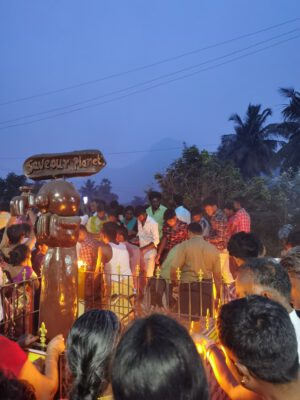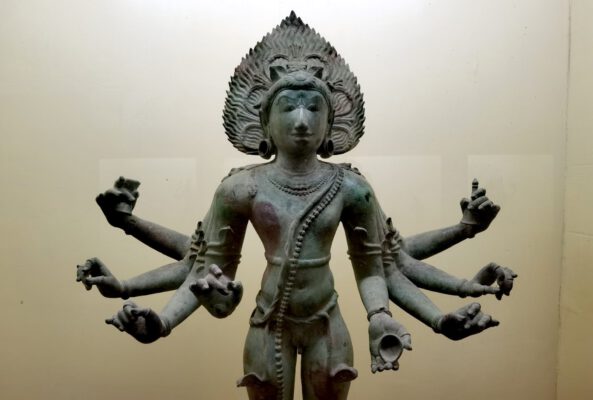One year of Auroville
II have lived through some intense years. Moving to a new country is always a major transformation - that was the case when I moved to London, then to the USA, France and now India. It's always important to me to leave my own culture in the background as much as possible and to embrace the new, which of course isn't new at all, just for me. And so one important task - especially in the first year - is to forget. Making space in your head, breaking down prejudices, surrendering to the magic and enjoying the rush a little.
The senses feel very fresh, the self very young, a childlike curiosity and naivety spreads that allows everything to take effect without prejudice.
I'm moving further and further away from the place that socialized me, and it's becoming increasingly clear why I'm doing this. Two things go together: the unease in a culture that I have always perceived as somehow foreign and the longing for a culture that would be more of a home.
India
India has always been this place of longing, and I'm certainly not the only one. Of course, it is the search for spirituality that brings people like me to India. Mother India calls and carries. The adventure that awaits you here is almost incomprehensible. It can hardly be grasped, neither by the act of grasping nor by the act of comprehending. The world as such reveals itself to be a different one. The European traditions of the Christian religion, occultism, exorcism, enlightenment, empiricism, romanticism, transcendentalism, modernism, postmodernism, etc. do not apply here. They are perceived as possible points of view, but no more.
Indian spirituality is about a synthetic understanding of life. It is not primarily about a scientific picture, the explanation of the material world or the construction of a simulation. In India, the question of consciousness is at the center. Consciousness is the starting point of everything. It has its starting point in consciousness itself. It is actually obvious that consciousness itself must exist, I have one, the reader has one, we can exchange ideas with other consciousnesses. Why is it so difficult to accept this in the West? (Husserl was quite close) But why is the statement of this fact branded as speculative? Just because it eludes the small-minded paradigm of scientificity? Isn't it much more the case that only what I find in my consciousness has any kind of relevance? Isn't that why the West celebrates so-called culture so much. But it is objectified, it does not invite a serious exchange about our own existence, but a discursive reflection. It is representative, it represents something as something else and it is used to represent, that is, to communicate power and powerlessness.
Adventure
It is this adventure of consciousness that makes traveling in the Indian cosmos so fascinating. Of course, you have to tame your skepticism and that immediately opens doors to all kinds of worldviews. Many are very strange to me. But they have a subjective validity. It would be presumptuous to want to place my consciousness above that of someone else. The contradictions that this creates must first be endured. This is not easy and causes a large number of crises in me. Crises in the sense of disorientation, restlessness and impatience. But the nice thing is that these crises can quickly be transformed into opportunities. They are invitations to meditate. An adventure of inner synthesis.
However, this synthesis is only possible if I admit to myself that my existence does not only consist of rational consciousness. I have a material and biological body, a life spirit and rational thinking, I have a world view and am capable of experiencing the sublime. I can reach higher levels of consciousness that move beyond the stimulus-response scheme. And I can approach the big question of our existence. I cannot answer it, but I can stay close to it. Many questions that present themselves as dilemmas to the rational mind are almost irrelevant on other levels of my existence, or even dissolve there.
This adventure is made possible by a whole series of different knowledge systems that have their origins in prehistoric times, i.e. the time before written language. The complex system of the Vedas was not written overnight. It is true that the knowledge it contains was revealed to the rishis. And no matter how skeptical one may be about this idea, one central question remains. Where does the idea of creation come from? And even more importantly, what is creation? How could such complex knowledge systems emerge at the beginning of history, of orderly time? What does inward vision see? Who hears by hearing, who sees by seeing?
Temple
I have decided to approach Indian culture through the temples. They are infinitely complex and I have to be patient with myself. It takes several lifetimes to even scratch the surface here, yet I want to try and capture an approximation. It will be amateurish, but perhaps that is precisely why it will be interesting.
The temples combine the knowledge of the Vedas, the Agamas, Tantras... It is architecture, sculpture, dance and music. They are places of worship, learning and coming together. They are embedded in the economy, ecology and social structures. They are intertwined with cosmology, meditation and spirituality. The bindu, the mantras, yantras, tantras, describe the relationship of the individual consciousness to the great, to the one. Unity and diversity manifest themselves in the temple. They are the living core of Indian spirituality. Many traditions seem to have existed unbroken for thousands of years.
I am still pursuing my project of reading Deleuze in India. Apart from difficult ideas like immanence in Deleuze, what interests me in Deleuze is the house in relation to art:
"Art perhaps begins with the animal, at least with the animal that marks out a territory and builds a dwelling (the two complement each other or sometimes merge in the so-called habitat). With the territory/house system, many organic functions change - sexuality, procreation, aggressiveness, food; but it is not this change that explains the appearance of territory and dwelling, rather the other way round: the territory implies the emergence of pure sensual qualities, sensibilia, which are no longer merely functional, but instead become expressive features and thus enable a transformation of functions. Certainly, this expressivity is already widely scattered in life, and one can say that even the field lily praises the glory of the gods. But it is only with territory and house that it becomes constructive and erects the ritual monuments of an animal mass that celebrates the qualities before gaining new causalities and finalities from them. This emergence is already art, not only in the treatment of external materials, but in the positions and colors of the body, in the songs and cries that mark the territory." (Deleuze, Gilles, Félix Guattari, 2003. What is philosophy? p.218)
What fascinates me about Deleuze is that his philosophy essentially describes how ideas come into existence. They emerge from the Implicitness, out of immanence. Ideas become active, they fly, form a flight path and thus connect. They create complexity. This way of thinking, which manages without axiomatics and without ideology, seems to me to be structurally very similar to the thinking of the Upanishads. Brahman unfolds itself in order to be able to experience itself. Where else but in the temple could this best be experienced?
So I sit in temples a lot, listen to the chants, bow to impermanence by smearing ashes on my head. From the inner chamber Garbhagriha the vibration spreads and manifests itself in the images on the walls of the temples. The Garbhagriha is only entered by the priest, who recites the mantras for the devotees. The bell, the incense sticks, the ablution and bedding of the gods, all this happens in the Garbhagriha. Here is the origin. "the territory implies the emergence of pure sensual qualities, sensibilia, which are no longer merely functional, but instead become expressive features and thus enable a transformation of functions." (see above)







